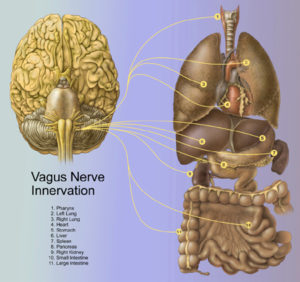The Vagus nerve is all about regulation and balance–probably the opposite of the infamous Las Vegas we all know. And unlike Las Vegas, we all actually NEED to know what is happening with it. Enter this week’s blog post—the amazing, the wonderful, the ever so important tenth cranial nerve!
HOLY VAGUS! THIS NERVE DOES WHAT!?!
The Vagus nerve receives and sends information to vital organs. See:

The act of “Vagus Nerve Stimulation” is a pretty hot topic these days in the research world. It’s showing promise for so many things…but what you may not know is that the stimulation doesn’t have to be an implant or invasive.
Research has shown that we can stimulate and improve neurological function without a physical implant. Science has proven that the best way to assess Vagus nerve function is heart rate variability. “It is possible to use heart rate variability analysis to calculate a quantitative index of autonomic function, which accurately reflects the sympathetic and parasympathetic tone and the sympathovagal balance.” (Eingorn) Researchers therefore focused on heart rate variability to assess non-invasive ways to improve Vagus nerve stimulation. This included the methods of acupressure, biofeedback, and Neurologically Based Chiropractic adjustments. Research done by Dr. Richard Barwell showed that patients undergoing Neurologically Based Chiropractic Care had improvements in heart rate variability. This was also seen in research articles published in Journal of Manipulative and Physiological Therapeutics. In my own office, thanks to using technology to assess heart rate variability I have also seen some great results with my patients.
Yes–my patients show an improvement in heart rate variability after care in my office!
While they are many different neurological components to the care at my office, the fact that it can help heart rate variability is pretty amazing stuff! This may also be why it has been shown that Chiropractic adjustments can help reduce inflammation. The health of our vagus nerve is responsible for so much, it only makes sense to want to keep it functioning at a peak level. The vagus nerve also then has a critical role in our stress response. It has even shown to have promise in predicting cancer! You read right—-CANCER!
“The parasympathetic system, and primarily the vagus nerve, informs the brain about multiple signals and returns the body to homeostasis. Recent studies have shown that vagal nerve activity independently predicts prognosis in cancer.” (Gidron) Holy cow! Vagus baby! So let’s keep that Vagus nerve functioning, eh?
Just another reason to keep getting adjusted and keep it a Myelinated Monday!
To learn more or reference the information cited here:
Dimmick KR, Young MF, Newell D. Chiropractic manipulation affects the difference between arterial systolic blood pressures on the left and right in normotensive subjects. J Manipulative Physiol Ther. 2006;29(1):46-50.
Gidron Y, De couck M, De greve J. If you have an active vagus nerve, cancer stage may no longer be important. J Biol Regul Homeost Agents. 2014;28(2):195-201.
Hardy K, Pollard H. The organisation of the stress response, and its relevance to chiropractors: a commentary. Chiropr Osteopat. 2006;14:25.
Jansen K, Vandeput S, Milosevic M, et al. Autonomic effects of refractory epilepsy on heart rate variability in children: influence of intermittent vagus nerve stimulation. Dev Med Child Neurol. 2011;53(12):1143-9.
Roy RA, Boucher JP, Comtois AS. Heart rate variability modulation after manipulation in pain-free patients vs patients in pain. J Manipulative Physiol Ther. 2009;32(4):277-86.
Zhang J, Marquina N, Oxinos G, Sau A, Ng D. Effect of laser acupoint treatment on blood pressure and body weight-a pilot study. J Chiropr Med. 2008;7(4):134-9.
